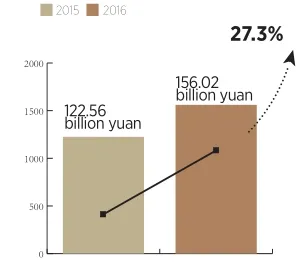FILIPINO ENGLISH TEACHERS BECOME POPULAR ONLINE
2018-04-14ByZhangLijuan
By Zhang Lijuan
“Thank you so much—you are like my second mom,”wrote a Chinese student to her Filipino English teacher. “I’m gonna be busy the next few days, so I cannot do the lessons.I will miss you, and I will be back very soon! I love you and will see you soon. Take care always.” A young woman who had been studying English for two years on 51Talk, a leading Chinese online English training organization, published her feelings about her teacher on jianshu.com, a website on which any registered user can post their creations.
According to the student,over the past two years of English learning on 51Talk,she has studied under at least 20 different teachers, all of them Filipino. Their guidance,encouragement and teaching methods have enabled her to express her thoughts in English fluently.
The online English training market has been booming in China in recent years, and many Chinese learners no longer demand foreign teachers from either the U.S. or Europe but instead choose teachers from the Philippines. Against this backdrop, English teachers from the Philippines, who are known for high teaching quality at an affordable price, have become popular in the online English training market in China.
The Philippine Star reported in 2017 that thanks to the maturity of internet video technology,China’s online education market has expanding. Its market size reached 156.02 billion yuan (US$24.8 billion) in 2016, up 27.3 percent compared to 2015. And the online English training market has developed particularly rapidly. Statistics show that well-known educational organizations in China such as 51Talk, First Future and class.hujiang.com have together recruited tens of thousands of Filipinos to teach English online.
Compared with English teachers from North America or Europe, teachers from the Philippines have personally experienced the process of learning English as a second language and know more about how to teach it.
Obvious Advantages
English is an official language of the Philippines, where most residents speak it fluently. The country has a favorable English environment sprouting from its strict English education system.As the progress of globalization accelerates, the Philippines has been interacting with other countries in the world more frequently, making Filipinos realize the importance of English. In more and more Filipino families, parents consciously encourage their children to speak in English and create a sound English environment, which is helpful for children to grasp English.
Wikipedia data shows more than 92 percent of the population of the Philippines speak English. In the U.S., this proportion is about 96 percent.Compared with English teachers from North America or Europe,teachers from the Philippines have personally experienced the process of learning English as a second language and know more about how to teach it. In terms of the education system and usage environment, English teacher from the Philippines are ideal for learners in Asia.

Group photo of English teachers from the Philippines who work for 51Talk.
Huang Jiajia, founder and the chief executive of 51Talk,remarked that the objective of education is to foster children with abilities rather than just knowledge. Filipinos learn English systematically starting from the primary school, so they have a better understanding of what it takes to learn it. And data has shown that their teaching effectiveness is as good as an English teacher either from North America or Europe. English teachers from the Philippines are also more patient and tend to use teaching plans tailor-made for Chinese students.
Nowadays, many Chinese parents believe that the English pronunciation of teachers from the Asia-Pacific region is more suitable for Chinese students’ learning habits. Some online education organizations have already set up operations centers in the Philippines in an aim to form a complete set of systems including recruitment of English teachers, training and teaching.
China’s online education market

The Philippine Star reported in 2017 that thanks to the maturity of internet video technology,China’s online education market has expanding.Its market size reached 156.02 billion yuan(US$24.8 billion)in 2016, up 27.3 percent compared to 2015.
Higher Cost Performance Ratio
The average monthly income of an English teacher from the Philippines is approximately 3,500 yuan (US$554.6), which is a relatively high income for Filipinos, so they have been enthusiastic about engaging in online education.
Nelli Samson, a Filipino online English teacher, had worked full-time as an English teacher for South Korean students for five years before becoming an English teacher for a Chinese online education organization recommended by a friend. Now, after four years,she has become a star online teacher. “I teach around 10 classes online on a daily basis,about six to seven hours a day,”she revealed. “My current salary is much higher than with my previous job. And the better income gives me a better sense of security.”
Huang Jiajia noted that“English is an official language of the Philippines, and their English pronunciation is close to American spoken English. Besides, there is no time difference between China and the Philippines, and the cost of local English teacher is relatively low. So the situation helps our company expand related knowledge and culture base.”
If an online student chooses an English teacher either from North America or Europe,tuition costs about 300 yuan(US$47.5) for a 45-minute class.If a learner chooses an English teacher from the Philippines,tuition is less than 100 yuan(US$15.8) for one class. With the development of online English education, online courses with high quality but low prices can effectively reduce regional disparities in educational resources and cut costs.
Meanwhile, issues such as how to evaluate the teaching qualifications of English teachers from the Philippines and how to ensure teaching quality are factors Chinese training organizations must consider.
